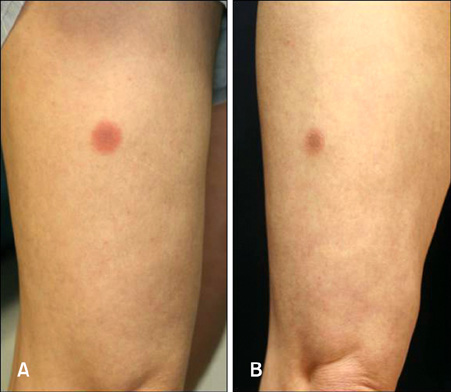Ann Dermatol.
2011 Dec;23(Suppl 3):S402-S403. 10.5021/ad.2011.23.S3.S402.
Fixed Drug Eruption Due to Allopurinol: Positive Oral Provocation
- Affiliations
-
- 1Department of Dermatology, Seoul St. Mary's Hospital, College of Medicine, The Catholic University of Korea, Seoul, Korea. jylee@catholic.ac.kr
- KMID: 2171883
- DOI: http://doi.org/10.5021/ad.2011.23.S3.S402
Abstract
- A fixed drug eruption (FDE) is characterized by the presence of a solitary or multiple, pruritic, well-circumscribed, erythematous plaques. These lesions have tendency to recur at same sites and heal with residual hyperpigmenation. With repeated attacks, the size and/or number of the lesions may increase. So far, more than 100 drugs have been implicated in causing FDEs, including ibuprofen, sulfonamide, naproxen, and tetracylines. FDE caused by allopurinol has been rarely reported in the literature, but there has been no confirmed case based on oral provocation test. Herein, we report a case of FDE in which the lesions recurred whenever allopurinol was administered for the treatment of gout. A 64-year-old male experienced repeated episodes of well-demarcated dusky erythematous patches on the whole body for 2 months. He took allopurinol intermittently for amelioration of his gout symptom, but denied other medication history. Pruritic erythematous edema developed on the previous lesions 12 hours after oral provocation of 200 mg of allopurinol.
MeSH Terms
Figure
Reference
-
1. Tsai TF, Yeh TY. Allopurinol in dermatology. Am J Clin Dermatol. 2010. 11:225–232.
Article2. Shiohara T. Fixed drug eruption: pathogenesis and diagnostic tests. Curr Opin Allergy Clin Immunol. 2009. 9:316–321.
Article3. Zedlitz S, Linzbach L, Kaufmann R, Boehncke WH. Reproducible identification of the causative drug of a fixed drug eruption by oral provocation and lesional patch testing. Contact Dermatitis. 2002. 46:352–353.
Article4. Lee AY. Fixed drug eruptions. Incidence, recognition, and avoidance. Am J Clin Dermatol. 2000. 1:277–285.5. Lee AY. Topical provocation in 31 cases of fixed drug eruption: change of causative drugs in 10 years. Contact Dermatitis. 1998. 38:258–260.
Article


